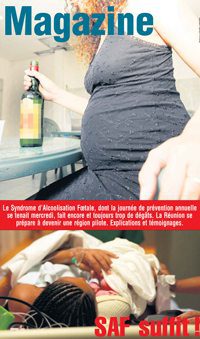Response to Le Quotidien, newspaper from Reunion Island, on the 10/20/14 – Dr. Alain Fourmaintraux
Congratulations to Le Quotidien to its issue on the economy (14 October 2014). Illiteracy, I read, is one of the major barriers to employment. According to the consulted economists, the population of Reunion Island involve about 100,000 illiterates.
Now, one of the causes of illiteracy is known: it is the achievement brain Fetal Alcohol . According to competent professionals in the field, a Reunionese in utero exposed to alcohol is born every two days; after 20 years it is 3200, after 50 years 9000. Just under 10% of the illiterate, it is a lot, right? Yet it is preventable !
The care given to 7600 dependent women (according to the SAOME network), if it exists (CSAPA and associated networks), provided by qualified health care providers, it does not seem to respond by far the potential demand (- 10 % of dependent women are monitored by these competent services). According to midwives and maternity doctors, most alcoholic women during pregnancy are not accessing care. This statement is shared by mothers who have escaped their addiction. It means that this low care which is provided depends of the voluntary patients. However, alcoholic women live in shame, guilt, exclusion and confinement. In addition, many of them are themselves victims of fetal alcohol syndrome. They are in practice unable to make the necessary arrangements and even less to honor the successive appointments. It should be added that the fetus despite himself in the womb can not ask an appointment! In terms of alcoholic disease of women and especially pregnant women, medical action can not function without a professional link with social action. The International Convention for the prevention of disorder Caused by fetal Alcoholization signed by 35 countries in Canada in 2013 stipulates that the responsibility for the prevention of Fetal Alcoholization should not be born solely by women, that prevention is a collective responsibility and must be based on compassion. In other words, competent people in social action and federating are needed at home and regularly to create bonds of trust and rehabilitation, which only allow alcoholic women get out of their confinement and lead them and their children by hand up care. This is what was, with some success, the network Réunisaf. Its success came from a collective will patiently built over many years (1996-2001) by all local actors (health, national, social, education, justice), expert families in experience and supported by a dedicated regional program. The ARS, removing with no real relay in 2012 this organizational model and decreeing that it could replaced overnight by CSAPA already overbooked, are doing a stepback of 15 years, and especially are not preventing the birth of many brain-damaged babies whose road to illiteracy is clear.
So we call all decision-makers to take responsibility.
If they have a true collective ambition for Reunion Island, they need to invest on what is the true wealth of our society that is children’s future and rally to protect promptly brains of Reunion children of this preventable scourge .
For the collective of Reunion : Invest in the future of our children, protect their brains
Dr. Alain Fourmaintraux Pediatrician, Expert in social issues Disorders Caused by Fetal Alcoholization
Dr. Thierry Maillard, General Practitioner, Addictologist
Dr. Denis Lamblin, Pediatrician, National Prevention Expert of Disorders Caused by Fetal Alcoholization
i « In Reunion Island, it is estimated that at least one child every two days is born with a brain injured by prénatal alcoholizaton. Some of the damages of Alcohol malformations are mental disorders, academic failure, behavioral problems, psychiatric disorders, crime … and especially suffering of individuals, families and society could be avoided. the economic cost to the special needs of the affected population is estimated at over 200 million euros annually



